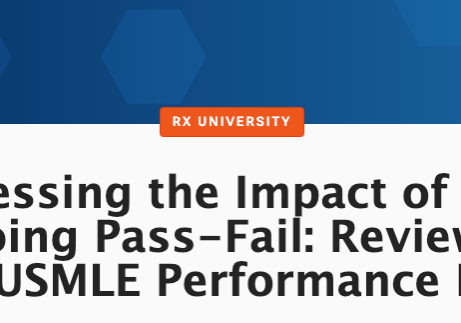This is the first post in a series called “Med School Done Right,” which will look at not just succeeding in medical school in the narrow terms of “getting good grades,” but at shaping the kind of experience you want to have during these (usually) four very important years of your life.
When you set a goal, you first have to be clear about it. In other words: answer the question “what is the goal?” This is an easy first step most of the time. In the case of medical school, “apply to and get accepted at a medical school” is pretty much all you need. But, in order to make sure that you’ll succeed, and, more importantly, that you picked the right goal in the first place, you need to ask “Why is this goal important to me?” For anyone who’s sat through a medical school interview or written a personal statement (and been honest in either process), “why” is a tougher, but more important, question to answer than “what.”
When you apply to medical school, the admissions committee will surely ask “Why do you want to be a doctor?” At the risk of being a bit redundant, I want to explore why this question is so popular on applications and in interviews, then talk about how it needs to be asked more often throughout medical school to ensure that your experience is one you enjoy and one in which you thrive.
Every medical school admissions committee is trying to figure out who will do well. On the very low end of their expectations, the committee want to avoid dropouts and students that don’t pass the boards, because this makes their school look bad and costs them more administrative work (students have to repeat, etc.). On the high end, students that excel both inside and outside the classroom, as well as in their careers, will raise the reputation of the school and increase the size of average alumni donations. But this question of who will do well and who won’t is a really tough one to figure out. Some research has been done and all the low-hanging fruit has been picked (high MCAT and GPA’s correlate well and, luckily, are easy to calculate and readily available), so committees are left exploring the more intangible aspects of your candidacy like your “character traits,” which, in the long run, contribute much more to your success in medical school and in life.
One of these intangibles is motivation. Your motivation is tied to your motives (‘motiv’ation), so the thought is that clear and strong reasons for ‘why you want to be a doctor’ will get you through medical school. Admissions committees aren’t asking what motivates med students to be difficult or to stress us out; they’re trying to make a decision about what’s best for their class, and this question just happens to be universally difficult to answer. Fortunately, though, the benefits of answering this question go both ways, and they’re really even tipped more in your favor than the medical school’s.
This process of clarifying what you want and why you want it doesn’t just apply to the long-term, far off, and broad goal of ‘becoming a doctor’ (because the reasons someone becomes a psychiatrist, orthopaedic surgeon, or oncologist are all vastly different). Honestly, this question is like asking, “Why do you want to be an engineer?” …of what? Software? Roads? Lamps? – Your motivations for each would probably be very different. Answering this question can be helpful in each part of medical school…including preparing for Step 1.
So, if you’re starting out in medical school, or you’re just beginning a rotation, or you’ve decided to pick up First Aid and start working through it early, stop and ask yourself those two critical questions:
- What exactly do I want to get out of this rotation/class/step exam?
- Why?
Because “succeeding in medical school” isn’t about just one step, it’s about succeeding in each of the little parts of the experience. One year, one class, one test, and one lecture at a time. And if you know the outcome you want at each step and are clear about why you want it, you’re more likely to succeed and appreciate the process. As far as I can tell, that’s not just the definition of succeeding in medical school, that’s succeeding in life.
The next post will cover some examples of this process in action before moving on to the tactical side of things. Don’t be surprised if we end up revisiting this concept more than once from a few different angles…because deciding on and “doing the right things” is infinitely more important than “doing things right.”





I really enjoyed reading this. I don’t know for many, but i am an IMG and coming to the US i see a HUGE difference, yes it is expensive, but at the same time alot of thinking has been put into why this is so and that so. While i was in medical school i must say i did not really think about most of the things mentioned here, i did really well by the way i was one of the best students, but i wish i had this kind of discussion or was talked to about it, but nonetheless i am glad that i am able to read this on here.
Thank you Firstaidteam
Hey Halimah,
Glad you enjoyed it, and great job doing so well in school. This idea of clarifying what you want, and then digging deeper to ask “why” is something you can apply to your life (residency?) now. I hope you do and that you get what you’re looking for in the process.
Best,
Luke